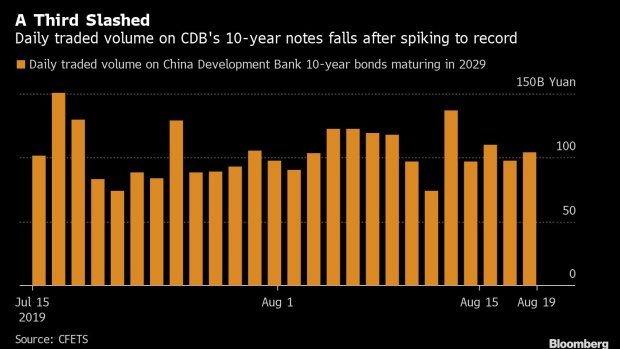Aug 20, 2019
China Is Cracking Down on Inflated Bond Trading Numbers
, Bloomberg News

(Bloomberg) -- China is cracking down on banks and brokers that it suspects of inflating bond trading volumes in an effort to win more business, according to traders familiar with the matter.
A subsidiary of the central bank is monitoring large transactions on the X-Bond system for signs of abnormal trading, the two traders said, asking not to be named as they’re not authorized to speak to media. The checks started after turnover on a China Development Bank note spiked to a record on July 16, according to the people. Daily volume on that contract has fallen by a third since.
China Foreign Exchange Trade System, an interbank trading platform affiliated with the central bank, didn’t immediately reply to a fax requesting comment.
Market participants interpret some of the activity by China’s smaller banks and securities firms as taking place for the purpose of increasing turnover rather than servicing clients, the traders said. The appearance of liquidity helps them rank highly on government-compiled list of the most active market players, attracting more business. Authorities last year acted to stop the practice in the onshore currency market, after transaction volume on the yuan surged to a record.
The practice doesn’t move yields as neither party places strong bets on direction -- instead the trades are matched or offset to boost transaction volume. China is pushing to modernize its bond market to attract greater capital inflows, as the yuan weakens amid an escalating trade war with the U.S. A sudden spike in turnover can confuse foreign investors already grappling with obstacles such as a volatile currency or a lack of hedging tools.
The daily turnover on the 10-year China Development Bank notes that alerted officials surged to more than 150 billion yuan ($21 billion) on July 16. The volume was 104 billion yuan on Monday, and the yield rose 1 basis point to 3.41% on Tuesday.
CFETS publishes a ranking of the most active players on the X-Bond platform every month. The platform, which was introduced three years ago and allows traders to offer quotes anonymously, accounted for 10% of onshore debt transactions in 2017.
To contact Bloomberg News staff for this story: Livia Yap in Shanghai at lyap14@bloomberg.net;Wenjin Lv in Shanghai at wlv8@bloomberg.net;Jing Zhao in Beijing at jzhao231@bloomberg.net
To contact the editors responsible for this story: Sofia Horta e Costa at shortaecosta@bloomberg.net, Tian Chen, David Watkins
©2019 Bloomberg L.P.